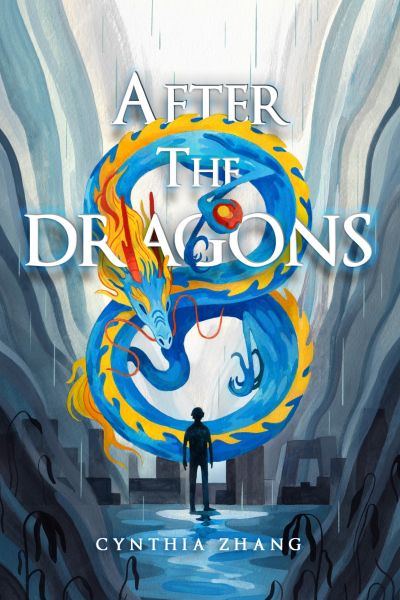A Dragon Lives Forever
After the Dragons
By Cynthia Zhang

2 Jul, 2021
Cynthia Zhang’s 2021 After the Dragons is an alternate-history climate-SF novel.
In a history not too far from ours, dragons are real. They aren’t magical dragons (as so many literary dragons are) but utterly mundane animals. Western and Eastern dragons thrived in different niches, which meant that the land-dwelling Western dragons were expunged as inconvenient, whereas the largely aquatic Eastern dragons survive to this day. Thanks to climate change, the Eastern dragons may join their cousins in extinction.
Still, if someone wants to study dragons, China is the place to do so. Dragon research lures mixed-race Eli from America to China. This confers on Eli many interesting experiences, not least of which is being regarded as an inexplicable foreign oddity.
Locked in escalating drought and relentless heat waves, Beijing is a challenging environment for dragons. Luckily, the people of Beijing are fond of their dragons. Less happily, this fondness often takes the form of betting on staged dragon fights, as well a talent for finding productive uses for dragon-derived products. Kai cannot save every dragon in Beijing, but he does what he can to save the handful he can.
Dragged out of the lab by supervisor Dr. Wang, Eli accompanies Wang to Mr. Lin’s dragon shop. It affords a glimpse of dragon life beyond the narrow perspective of the laboratory. It also serves as a meet-cute between Eli and Kai, Lin’s diligent employee. Their shared interest in dragons proves the pretext for the pair to discover other shared interests.
There are lots of reasons why this particular romance could be ill-advised, not least of which is that it comes with an expiry date. One of the many gifts that drought and air pollution have conferred on modern Chinese people is shaolong or burnt lung, a progressive, incurable, fatal lung disorder. Having been diagnosed late and without the funds to afford expensive medical treatments, Kai is well aware his remaining lifespan is almost certainly short. Kai deals with this by avoiding thinking about his condition. How will Eli to deal with this?
~oOo~
After the Dragons takes the interesting perspective that the Chinese track record on civil liberties is not so different from the American, which I suppose really depends on which Chinese and which Americans you ask. The Chinese are franker than your standard American (at least the varieties found on line) about their astonishment and unfamiliarity with persons like Eli (admittedly, half-Chinese but not that is not the half the people of Beijing notice).
Nothing is more interesting than arguing with a publisher over which genre to choose for marketing purposes. While this book does have dragons, generally deemed a sufficient litmus test for fantasy, these dragons appear to be entirely mundane. Yes, European dragons breathed fire but perhaps this is due to a chemical incendiary analogous to the Bombardier beetle’s chemical weapons. In this particular case, dragons don’t necessarily mean fantasy.
In contrast, the droughts and the burnt lung they bring and the charmingly inequitable efforts to manage same do place this nicely in climate SF. It is possible to greatly extend the lifespan of people with burnt lung, given money. The same money can render drought-driven water rationing irrelevant. However, the story isn’t about the one percent. Mitigating measures for either drought or burnt lung are beyond reach for Kai.
I was bit frustrated that more space was not spent on dragon conservation programs. But then, nothing in the cover or the blurbs promised a conservationist plot.
As one might expect, the fact the romance takes center stage means that, for plot reasons, it will hit a number of road bumps, from concerns about social prejudice, to the fact Eli is only temporarily in China, to Kai’s legitimate concerns about what role his illness plays in Eli’s fondness for him. That said, these are supposed to be bright guys1. Surely, these issues can be easily resolved with vigorous debate, applied logic or if there is insufficient data, a roll of the dice? But I suppose needlessly complicated romantic lives is a behavioral characteristic of anatomically modern humans2. It does suggest there may have been more reasons for arranged marriages than parental convenience and dynasty building.
After the Dragons was a pleasant diversion. While some readers may ask “were the dragons actually necessary?” the answer is of course, always add dragons if there is room.
After the Dragons is available here (Amazon US), here (Amazon Canada), here (Amazon UK), here (Barnes & Noble), here (Book Depository), and here (Chapters-Indigo).
1: Despite which, it seems like everyone around them works out what’s happening before Kai and Eli do, which seems pretty implausible. By virtue of being them, wouldn’t they be in the best position to understand their circumstances?
2: Data is lacking on the other varieties, although the fossil record is somewhat … suggestive.
